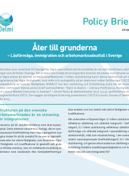People born outside Sweden have a significantly lower employment rate today than the domestic-born population, but have a relatively high proportion of self-employed. Is self-employment an opportunity to increase the employment of foreign-born? With this publication, Delmi wants to contribute to providing a clear picture of the knowledge that exists about the conditions for immigrants' entrepreneurship today. In this knowledge overview, knowledge about immigrants' entrepreneurship and the development of the research field is presented and discussed, both in Sweden and internationally.
Some overall conclusions and recommendations
- The authors emphasize that measures to improve access to credit should not only target start-ups, but also the development and growth of businesses.
- Initiatives to support entrepreneurship among immigrants should not replace actions for primary labour market integration. Many initiatives have aimed to promote entrepreneurship as an option or alternative for the foreign-born, but often this leads to individuals becoming stuck in small-scale, less profitable, one person operations.
- More attention ought to be given established foreign-born entrepreneurs who develop, grow and hire, since the research shows that small businesses run by foreign-born, on average employ more people, and often people with a foreign background.
- Many immigrant entrepreneurs have higher education and qualifications than required for running the business. Assistance in matching individual qualifications to entrepreneurial activity in the ”right” industry would lead to stronger companies and better use of resources.
About the authors
The research review, Immigration and entrepreneurship (2016:7), is written by Martin Klinthäll, Zoran Slavnić and Susanne Urban at Linköping University, and Craig Mitchell and Tobias Schölin at Lund University.
Picture by Rod Long from Unsplash.





